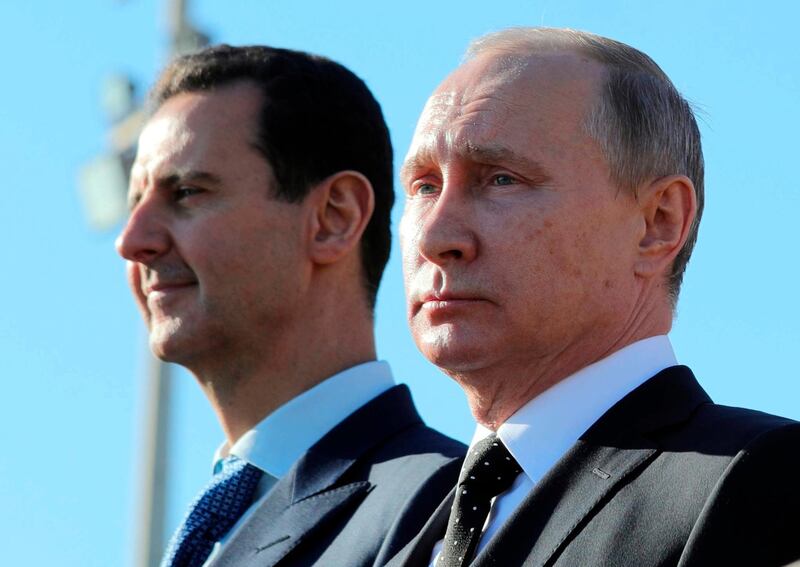Russia's defence minister said on Tuesday that the country will maintain a permanent presence at two airbases on the Mediterranean coast of Syria, as Syria's opposition groups rejected Russia's proposed peace talks, accusing Moscow of failing to pressure President Bashar Assad, to end the conflict.
“Last week, the commander-in-chief [Russian president Vladimir Putin] approved the structure and the bases in Tartous and in Hmeimim [airbase]. We have begun forming a permanent presence there,” Sergei Shoigu said, as quoted by the RIA news agency.
The agreement will allow Russia to keep 11 warships at Tartous, including nuclear vessels, for 49 years, although the deal allows for an extension.But the Hmeimim airbase can be used indefinitely.
Since 2015, Russia has used the Hmeimim and Tartous bases to provide naval and air support for the Syrian government’s battle against rebels seeking to overthrow president Bashar Al Assad. Russia has also provided ground troops and heavy weaponry, which have helped Mr Al Assad regain considerable territory in the last two years and created a sense that his government has largely “won” the war.
Mr Putin was in Syria earlier this month and declared victory over ISIL, which had until this year controlled significant parts of the country. He also said Russia would begin withdrawing some of its forces.
Meanwhile, the US military has also announced an open-ended presence in the country and continues to support militia forces controlling large parts of eastern Syria. On Monday, Russian foreign minister Sergei Lavrov criticised the US for training “terrorists” in the country.
The Syrian government’s forces, which include an array of local and non-Syrian militias, including Lebanese Hizbollah, are moving in on already-surrounded rebel pockets across the country. On Tuesday media outlets aligned with the Syrian government reported gains near the country’s border with Lebanon and the Israeli occupied Golan Heights. A victory there would give the government back full control of Syria’s border with Lebanon for the first time since 2012.
That has also stoked fears that such control will allow Hizbollah to more easily move weapons from Syria to Lebanon. Israel has launched at least a dozen strikes inside Syria in the past five years, apparently targeting Hizbollah weapons stockpiles.
There were conflicting reports on Tuesday of a ceasefire between rebels fighting near the town of Beit Jin while negotiations were underway to transfer rebels from Jabhat Fatah Al Sham, an Al Qaeda-linked faction, to other parts of the country. In similar deals earlier this year, their fighters were moved to Idlib province in northern Syria, which is still controlled by rebel but has been under siege for months.Idlib is also supposedly one of three "de-escalation" zones agreed by Russia, Turkey, Iran and Syria but has been heavily targeted and a ground invasion appears imminent.There were more than 150 aerial attacks in southern Idlib province on Monday.
The most recent round of UN-backed peace talks in Geneva earlier this month made no progress as the Syrian government’s delegation refused to meet directly with rebel representatives. Now the Syrian opposition is spurning the Russian-sponsored talks in Sochi beginning on January 29, declaring them an attempt to "circumvent" the UN-led process.
"We reject this, and we affirm that Russia is an aggressor that has committed war crimes against Syrians," said a statement signed by 40 rebel groups, including Ahrar Al Sham, Army of Islam, the Free Syrian Army and political opposition groups, which have banded together under the umbrella Southern Front. "Russia has not contributed a single move to alleviate the suffering of the Syrian people and it has not pressured the regime .......to move an inch toward any real path toward a resolution."
But the rebel forces have seen their leverage diminish with the end this month of a CIA-run programme that supplied cash and weapons. A rebel commander from the Horan Division, one of the groups that rejected the Sochi talks, said the end of support from the US had left many of his fighters “just watching”.
“We are still hoping that the friends of the Syrian people will not abandon the Syrian cause until the Syrian revolution achieves its goals,” said Raed Al Radi, the commander. “The allies of the regime haven't abandoned it.”





